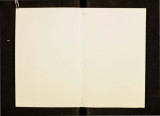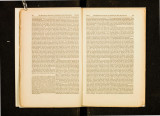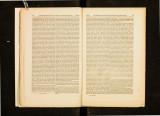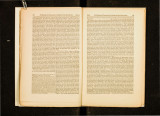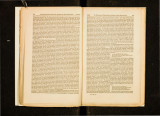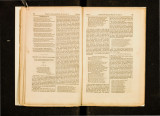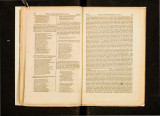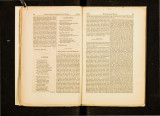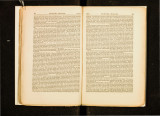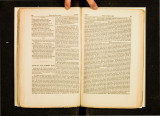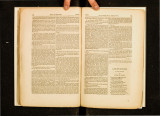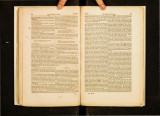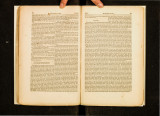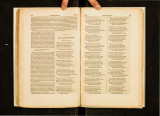| OCR Text |
Show 472 Remarks on Various Late Poets, No. 5-L. E. L. (AUGUST, self to pilfer from he r own stores, and some six or "Audas !m:lrkcd the gallant line eiO"ht of the best moltoes in Ethel Churchill are th:re published for the second time. For instance, and various other little deficiences, ''hen her haste a passage quoted above, commencing, ''.And Ins uot allowed her genius fair play. It will be this, then, is '.ove's ending/' f?.rms p~rt of' a littl~ s~en from the passages already quoted, thal her brtlpoem, ".LO\'e s Last Lesson., puhltshed 111 1826. lianl imagination supvlies her with a singular abunalo~ g \I~Jth the •• G~ld:n Vwlet," ~nd ten years dance of similes and figures, many of them striking after, with small va~tatw.ns, figured Ill tbc nrwel. andoriginal,butshemixeswiththem,toofrequently, The following ~eauttful .lmes c~nstit::te, the ~hree the hackneyed comparisons of roses. lilies, tulips, last stanzas1 of a. short. ptece eutttl~d 1 he L~ly of morning stars. setting suns, and otl 1er poetical p<~rathe Valle)',' _P~hltshcd tn the Draw!llg Hoor~ Scrap phernalia, which have served needy puetasters until Bo.nk fur 183.6, an1l by a few verbal a~t.erauot~s a~e charity oug ltt to lillerate those oppressed and supcrtwJsted to sutt th.c second purpos~, bemg perfecttn annuated figures of speech from farther service. themsel.ves. 1L IS somewh~t c~nous that they ap-. Her prolixity is e\'iu ccd in various ways, which peared tn tbe two forms wt~h Ill. a few months of sometimes draw largely on the patience of the each other. \Ve can well unagme thern to hal'€ reader Thnu :dltS which miO"ltt be tersely and epibeen originally wrillen to her first love, to whom ~>ramJ~atically ~ondensed iut; a coupleT, are weakshe wa~ engaged, Unt w~th whom she br?kc. ofr the ;ned and diluted into eight or ten lines. Her match 111 consequence of the slanders aflectmg her sonrrs and minor pieces are rarely less than thirty Pass through the green lane's serpentine," character. or forty lines, frequently much longer, and it rc- J ~:ly not, regret me- quires a poet of more power and skill than L. You 11ill not rPgret; E. L. to sustain the strong emotion and vigorous You "ill try to forget me- thought necess:uy to fi:< our atteution and admi-w~:~~~;~~~:~;~~ t :~r!~~·h other- ration on fugitive pieces of such length. Poloorc, 0! misery to hear Thoscnamesfromanolher Thatonre were so dear. Whalslightlhingswill sting us Th:1t!Jreatheofthe past, And slight things v.ill!Jring us Thoughts fated to last! The fond hopes that centred lntheeallaredcad; 'l'heironhasenlered The soul v.hcre they fed. "Like oti•<'rs in seeming. \Ve'!l v.alk lh rough life's p;trt, Cold, careless, •tnddrearninc;,\ Vith dc11th in the heart. No hope-no repentance; T he !tpring of life o'er; A!ldicdwiththatsemence- I love thee no more!" Il wilJ be seen by the l'arious extracts which we have made, that l\•liss Landon possessed au enviable command over poetical language, and that she can wear the fetlers of rhyme with much grace and ease. h is therefore scarcely excusable in her to allow her indolence to luxuriate in the occas ional slip-shod style and harsh \'ersification which reminds us that easy writing is by no means necessarily easy reading. Our ears are also offended frequently by her indulgeuce in \\'Orn out poetic phraseology, sur:h a 'ur ever," for "be/Ore," ''what time," "Wf'y wine," "hlooms," 11 beams," "serpentine'' used as a substanti\·e, as "A round were ~tef'ps, when" the wild vine Hung "reatbed in many a serpentine." "The•e winds a path,-the clear moon8hinc P1erces not it.s deep serpentine." the first song writer of modern times, is carefnl ne\·er to expose his powers to so se\'t:re a test, and rarely permits a song to exceed twenty or twentyfour lines, and, in consequence of tbis, he obtains the highest praise that can be (:onferrcd on themwe always regret coming to the last line. 1t required a!] of Hymn's vigorous expression and stroug passiou to expand a love poem to any length, and in bis various stanzas to Thyrza, he has lefl us a monument of genius. Miss Landon also wearies us with her long and frequent descriptive passages. This is a rock on which most careless and rapid wri1ers are apt to strike, and sl1c is no exception. \Ve confess that we are often tired of the endless succession of lofty halls, graceful columns, Urilliant lights, gorgeous hangings, 1douds of perfumes, drooping jes~ samines and blushing roses which glide before us in constant confusion throughout her poems. V¥~ ith a teeming im:~gination, and a ready hanJ, she i~ a proficient at description; and though she ofteu presents us with a Ueautiful and striking picture, she O\·ertasks us with the length, number and frequent sameness of her paintings. The following passage we give as a very f<tvorable specimen; it possesses a quiet and homely Ueauty in its rustic simplicity. "It was a lone v.hite church, the elm which grew Beside it, lJhadov.cd half the roof; the clock Was placed where full t!"Jesunbeams fell ;- what •leep, Simple morali1y spol.c in those hamls Going their "ay in silence, till a sound, Solemn and sweet, made their appeal to Time, And the hour spoke its only \o\arning! Strange To note how mute the sofL sound of the wren, \\' hoile nest was in that old elm tree, l.oecame, \\'hen the clock struck, and \\l.en it ceased again, 18·15.] Remarks on Various Late Poets, No. 5-L. E. L. It~ music like a natuml anthem !Jre:tlhed, Lowly the osicred gravf'~ nrouml, wild /lowers T heir epitaph, and not one monument \Y,,s there, rich with tbe sculptor's graceful nrt.'' Pictures" in this little volnmf' are exquisite. They possess a species of indefiuaUle and i11describable charm which seizes us completely, and for which we finrl it difficult to assign an adequ:lte t·eason. Anotlalr e\•il which arose from her dependence The varied melody of some of these little poems is on her pen, was the necessity to which it subjected perfect. and peculiar, fi lli ng thE~ ear, and taking the her of writing, nut according to her own genius, but senses hy storm. They have the fault of length tltP. demands of the bool< sellers. A poet who once and diffuseness in common with tl1c rest of her Uegins to illustrate annual plates, may he re~prded poetry, or we should quote one f!1r the benefit of as having entered himself fur Lethe by a rapid con- such of our readers as have not had the good forveyance; and it required all the real poetry and tune to meet with them. \Ve will par1ieularizc: ready tal e nt of L. E. L. to support her under the "The Supper of Madame De llrin\·illiers," ''The course of" Dr::Hving Room Scr:.Jp-lluoks,'' ''Fairy Death nf Alexauder" and "The Dream in the TemAlman:~. es," "Fnrget-me-nots," ''Literary Souve- pie of Sera pis," as being especially be.autiful. UnJlirs,"" Easter Gifts," &c. , &c., into which she fortunately tltey are equally untractable, and the plunged. Tbe very idea uf sitting down to write impossihi!ity of doing them any thing like justice poetry concerning some twenty or thirty engravings, in an extract alone pre\·ents us from laying part:s most nfthem landscapes, is enough to frighten every of them before the reader. \Ve canuot, however, thought out of a poet's brain, and we can but wonder resist quoting a stanza or two frnm "The Death of how Miss LanJon sun•i\•ed it. Of the manner in Camoens,'' though we feel sensible that we are which these tasks were undertaken and executed, gil'ing a most unfavorable impression of it by thus we may judge by tho following extract from a let- mutilating it. We would call atter.tion to its pe~ ter written immediately after the completion of a cu liar melody. volume of" Fisher's Dr.awing Hoom Scrap-Book," a \\·ork for which she wrote an irnmense deal, and "Pale f'omes the moonlight through the lauice gleam1ng, in whi c.:h the engraving-s were chit>fly views in y;;a:~oi~~ i:.~~~e];::.1i~:~ ~~:n;:a:~a~~erl:~~~ nre slreamin.~r:- lndia. "The volume just cnmpleted contains one Df'ws-oh how soft afler Augn~t's sultry day! long poem founded nn Indian history; a connected i"iarrow is the lnnice-oh! let nil_!ht's dHrkness cover story called the 'Zenana,' and longer than the Chamherso wrelc hed from any mortal eye. ' Venetian Bracelet.' Jlow my innenuity has Q,·er yon pallet "l•atevf'r aharlows hovPr. bee~ ta:ow~l to. bring in the \'ari.ous plac:s ~.and pray They are le~::.~~kitt~:~h~·::~;::~ drawing nigh.- fnrgtve thts httle tenJer efruston of vanny, I du Let the l'l ellry one 110 ...,. die! pique myself oo contriving to get from Dowluta-bad to Shusher, and Penawa, and the Tried Figure in the Caves (If' Elephant a, and thence to Ibrahim "Through 11 weary world path, known to care and sorrow, Padshah's tomb, &c., &c. But 1 am too sick of Still was her influence upon hi:s beint! l'ast; all t.hese hard names to inflict any more upon you." She v.as the hope that whispered of to·morrow- With such inspiration our otdy wonder is that the She 1\a.s th.e memoried music of the pllst-platitude and common-~lace which distingui~h many S!~f"~~: ~~~~~~~r~:~n~;~~;·, :1:~,: ~~:~:r'i~1,:0~1~sr~'_:athing of theEe almost numberless fragments of tllustra- To irs Southern lang·•~ge long h:1rn.ony bt"queatbing, tive poetry, are not even more remarkable. Haunting e\'er~· wild wa1·e, dashing on the shore, In looking eomprehen.sively over her poems, we Ay, the poeL's mu~ic do not find as much improvement and developmPnt Is lovely 11s of yore. of new powers as might Uc expected from the "Dre:lm not that the lo\'C which haunts the poet's spirit length of time in which she poured forth lhe bright Is the common passion that ~wectens rl~ily earth : creations of her fancy. Still, we ha\'e reason to From awor!rlethere:llitsnaturemustinJ,erit believe, that had she not been cnt ofl' at so early an ,\ II the high irmginings that crowded rounr! its hirlh: :.tge, she would have produced something far beyond F'rom the pur.c, p~le ~t;us, amid the.ir midnight watches, any of her previ~us efforts. Among. t~e postl~u- F'r~11::~: f;~:~~~~~:~~~~~~~::: ~~~~~'/:;!n=·~oJs it catches moos poems publts l1ed, are .SC\'eral ev tnctng genws Charms round the carelcss and the usual path to shine. of a higher order than is discoverable in her earlier s1wh is the poet's pas.sion,- writings, The short interval of happiness between Such, Camocns, was thine." !;::tl:~~:~:~~~ese:1i~hto~:~:~:~~~~~v:;:bl~~: ~11:~~:~~ In writing these pages, we feel some fear lest ercise of her powers. In these poems she seems we have placed our animadversions on th(_) numcrin a g reat measure to have aba ndoned the quEru· ons faults of L. E. L., in a more consp.ir:uous light lous complaints of the nothingness of life which than our sincere admir:~tion of her std! more nuconstitute one of the factitious beauties of her fo r- merous and important excellences. As a poet, she mer pOems, and which we cannot belie\·e to ha\'e ranks as ldgh as perhaps a woman can, and in the been natural with her. Some of the" Subjects fur permanency of her reputation we feel delighted as Vo1 .. X I-60 |


